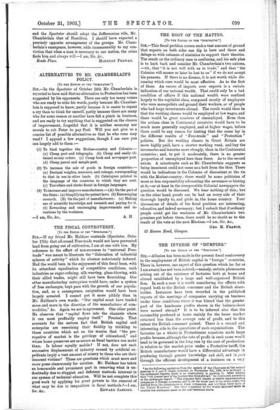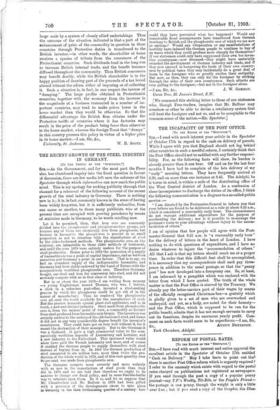THE INVERSE OF "DUMPING."
[To THE EDITOR OF THE "SPECTATOR."] Sin,—Allusion has been made in the present fiscal controversy to the employment of British capital in " foreign " countries. There is, however, one aspect of this question which (as 'far as I am aware) has not been noticed,—namely, certain phenomena arising out of the existence of factories both at home and abroad established by a large and well-organised British firm. In such a case it is worth considering the effects with regard both to the British consumer• and the British share- holder. Instances have been recorded in the published reports of the meetings of companies carrying on business under these conditions where it was hinted that the greater part of the handsome profits shown in the balance-sheet were earned abroad.* It is to be inferred also that the commodity produced at home mainly for the home market returned less than the average rate of profit, and to this extent the British consumer gained. There is a second and interesting side to the operations of such organisations. The factories (as a whole) in Protectionist countries made large profits because, although the rate of profit in such cases would tend to be governed in the long run by the cost of production in relation to the market price under a Protective tariff, the British manufacturer• would have a differential advantage in producing through greater• knowledge and skill, and :n part through the 'efficient development of a business on a very • As the following quotation from the speech of the Chairman at the annual meeting of S. and P. Coats, Limited, on November ath, 1899, is to be found in the newspaper reports, there is no impropriety in quoting it. After stating that "the greater part of the business was done abroad," he continued„accordang to the newspaper report '• The company held Chants in twelve manufacturing companies in foreign countnes, and by Jar the larger part of ells entire profits was derived from the investments in these companies, and not from their mills in the United Kingdom." The ratio suggested by the words italicised tends to condrm the statement made in the next sentence above. large scale by a system of closely allied undertakings. Thus the outcome of the situation indicated is that a part of the enhancement of price of the commodity in question in these countries through Protective duties is transferred to the British investor,—in other words, the shareholder at home receives a species of tribute from the consumers of the Protectionist countries. Such dividends tend in the long run to increase British internal trade, and the benefit becomes diffused throughout the community. Thus British consumers may benefit doubly, while the British shareholder is in the happy position of drawing part of the proceeds of a tax levied abroad without the odium either of imposing or of collecting it. Such a situation is, in fact, in one respect the inverse of "dumping." The large profits obtained in Protectionist countries, together with the economy from the increase in the magnitude of a business transacted in a number of im- portant countries, may tend to make prices lower in the home market than they would be otherwise. So that the differential advantage the British firm obtains under the Protective tariffs of countries where it has factories may result in the price of the product being lower than otherwise in the home market, whereas the foreign Trust that " dumps " in this country pursues this policy in virtue of a higher price in its home market.—I am, Sir, &c., University, St. Andrews. W. R. SCOTT.



















































 Previous page
Previous page